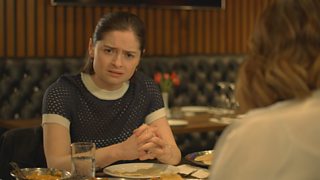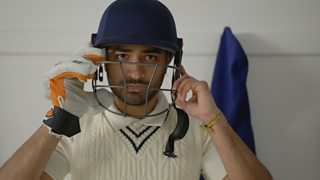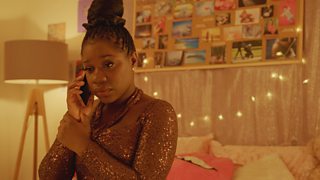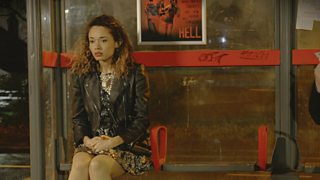±«Óãtv Writersroom and ±«Óãtv Studios Continuing Drama Productions have released the sixth series of The Break. The bold, short-form drama series is a collaboration between ±«Óãtv Writersroom, ±«Óãtv Three and and aims to showcase the best original, contemporary stories that reflect modern life in the UK.
For this sixth series, all the writers are from the West Midlands region. Following an open call out on the ±«Óãtv Writersroom website the writers were selected, three of whom were part of ±«Óãtv Writersroom’s Coventry Voices development group, an initiative which ran as part of Coventry City of Culture in 2021 to develop their writing skills and secure opportunities across the ±«Óãtv’s scripted output.
The four successful writers are: Katie Arnstein, Laura Maloney, Tal Davies and Omar Khan.

(Credit: ±«Óãtv)
The Executive Producers for ±«Óãtv Writersroom are Simon Nelson and Usman Mullan. The Executive Producers for ±«Óãtv Studios are Mike Hobson and Nichol Hoye.
Simon Nelson, Development Executive at the Writersroom, shared his thoughts on Series 6 of The Break:
"We’re delighted to release our latest series of The Break representing some amazing writing talent from the West Midlands. Having set up a Voices group in Coventry and holding several workshops in the wider West Midlands, we invited local writers to pitch a short film idea for this series. In partnership with our colleagues in ±«Óãtv Studios – and across several very intensive filming days – we created these films which we hope reflect the voice and spirit of the area."
Watch Series 6 of The Break on ±«Óãtv iPlayer
Please enjoy watching their dramas and find out more about their experiences below.

Sophie (Anna Bradley) and Sophie's Mom (Vicky Hall) in BTEC Britney (Credit: ±«Óãtv/Grab)
BTEC Britney by Tal Davies
"This is my first commission, and I absolutely underestimated how eye-opening it would be. It’s easy to get stuck in your own little bubble when it’s just your written project, but seeing it come to life on screen was invaluable.
The process becomes so collaborative from the moment your script goes into development – the episode is no longer just your baby, and the piece will evolve in ways you didn’t expect, but will be so much richer for it! I also learned a great deal from a practical standpoint when I attended the shoot. There were times in my script where I thought I was keeping it simple, such as the Balti house scenes, but I quickly discovered that the inclusion of food and several small stage directions make it much more complicated to film from a continuity perspective! These are factors that I wouldn’t have even thought of, had I not seen first-hand how much work goes into every small detail when filming.
This whole experience has had a really positive influence on my writing, and I’ve gained so much more awareness and fresh perspective to bring to future projects thanks to this opportunity."

Zayn (Ryan Rajan Mal) in Cricket Test (Credit: ±«Óãtv/Grab)
Cricket Test by Omar Khan
"I’d watched The Break since season 1 and knew it was an incredible opportunity for new writers to have their worked screened on ±«Óãtv Three. I pitched the idea of “The Cricket Test” which was inspired by the racism case going on at Yorkshire County Cricket Club.
I was amazed to have been selected as I knew it was highly competitive. The drafting process was quick and all happened within a month. I was grateful to Simon Nelson for the time taken to get my script right and then a few weeks later we were filming in Birmingham. I was invited to the shoot and thrilled to see my work come to life – my original character and my original story.
I’m delighted to know that I have a ±«Óãtv Three credit and a solid example of my work to show the industry. Schemes like this are so worthwhile as they give you real world experience of being able to take the project from idea to a finished episode all within a few months. I have learned massively from this process and would advise any other writers to apply when the next opportunity comes."

Cassie Mayhurst (Me’sha Bryan) in Loved (Credit: ±«Óãtv/Grab)
Loved by Laura Maloney
"The predominant challenge of writing a short monologue is condensing the drama without losing any dramatic tension or heart.
I started writing LOVED after seeing the competition posted on ±«Óãtv Writersroom and thankfully, Cassie came quite easily. She poured out into a very (too) long, fifteen page monologue. As a middle class, state educated British woman, I wanted Cassie’s vulnerability and femaleness to reflect the conflicts that I and many friends have experienced. Cassie’s under pressure; a victim of societal expectations. The initial pitch was overloaded with themes and contemporary issues, but I hadn’t yet managed to communicate the story I wanted to tell. However, I understand the producers, Usman Mullan and Simon Nelson, read the monologue, and found Cassie’s voice intriguing.
With the help of a workshop led by Usman and a few 1-2-1 sessions with Simon, I honed the pitch, focussing on Cassie’s singular conflict – why do I really want a baby? For the first draft this made the writing a lot simpler, and the Cassie that we see on screen is very much a stripped-down version of my initial idea. She’s better for it. Cassie feels very personal to me so, as with all script work, getting from script to screen is a process of letting go, but I know she’s in safe hands."

Bec (Olivia Swann) sitting at bus stop in Wolverine Woman (Credit: ±«Óãtv/Grab)
Wolverine Woman by Katie Arnstein
"I was over the moon to learn I'd been chosen to write for ±«Óãtv Three's The Break earlier this year. What followed, of course, moments after celebrating, was the crushing realisation that I would have to write something for ±«Óãtv Three's The Break.
The piece I ended up writing, Wolverine Woman, is the first thing that I have written for television and so the pressure was on. Here is what I learnt from this incredible process which I am incredibly grateful for.
- If you keep coming back to an idea, it is probably the one you want to explore, so trust in it.
- Try to solve all of the potential problems in your piece at the pitch stage of writing. If you, like me, would rather put off difficult things until later, you're giving yourself less time to find a suitable solution and probably be stressed.
- If you've got five minutes to tell a story, try and use every second of those five minutes to tell it.
- Make the script as clear as possible in terms of your vision for it and then trust that the director (in my case the superb Clare Anyiam-Osigwe) and their team will realise it.
I feel like Wolverine Woman is everything I want to say in five minutes and I have learnt so much from this process."
Find out more about The Break and watch the films from Series 6 now on ±«Óãtv iPlayer
Catch up on all previous episodes of The Break on ±«Óãtv iPlayer
